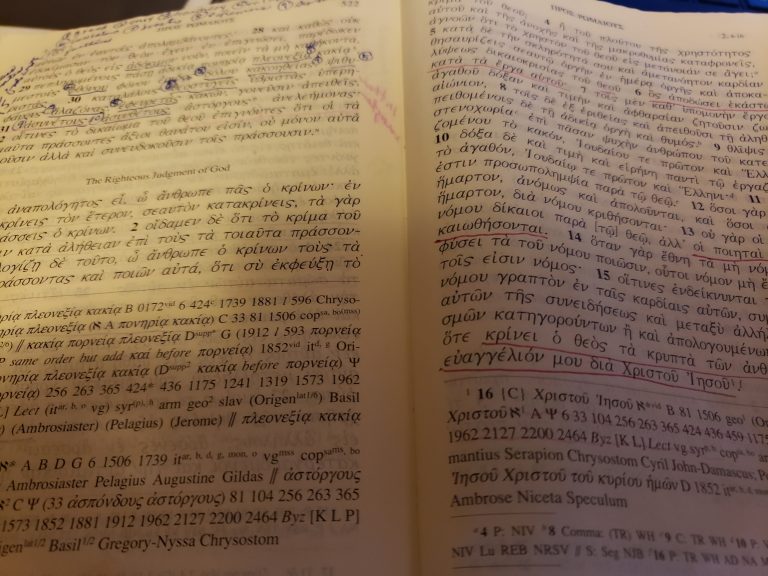Biblical Decision Making
My previous post, Does the Bible Condone Slavery?, has produced some interesting responses, and one very valid question is just how I think the Bible should be used in making decisions. I’m going to try to keep this brief, but I’m not very good at that, so bear with me!
The most common analogy I’ve encountered for the Bible is that it is like a boy scout manual. The problem is that as far as I can see the Bible is almost totally unlike a boy scout manual. The Bible is a book containing a large number of stories, and materials from a variety of documents, often ones written from a different perspective. By assuming the kind of unity that would be expected of a scout manual, we often miss what the Bible is actually saying. For example, which attitude toward foreigners is more appropriate, that of Jonah, in which God saves them even though that makes his prophet angry, or that of Nehemiah who runs all foreigners out?
I often use the analogy of a toolkit, though this is only one of many. My basis for this starts with Proverbs 26:4-5: “4Do not answer fools according to their folly, or you will be a fool yourself. 5Answer fools according to their folly, or they will be wise in their own eyes” (NRSV). OK, so which is it? Should one continue to forgive over and over again (Matthew 18:22), or should one take the matter to one’s congregation (Matthew 18:15-17)? It would depend on the specific circumstances. I know that I have often encountered cases in which a fool required answering (and what do I do about the command of Jesus not to call anyone a fool?), and many other cases in which the best choice was silence. I take the tool from my toolkit that seems to work best, and I hope I have wisdom to use the right one.
Further, nobody actually keeps all the Biblical commands, especially those who are the loudest in claiming that they do. Consider the ten commandments case in neighboring Alabama. We had the odd image of Christians bowing down in front of the monument to the ten commandments (I know, they weren’t worshipping it, they were praying about it), and protesting its removal. Removing the monument was supposed to be a major blow to moral values. But the vast majority of the people who were protesting do not keep the command written on that monument to keep the seventh day of the week as the Sabbath. I’m sure they have good reason to ignore or alter that command–I don’t keep Saturday as the Sabbath either–but nonetheless isn’t it interesting to place a monument to a command that most seem to agree was altered? Or how many of those people do you suppose have pictures of Jesus on their walls at home or at church? Does the word “image” come to mind? Now I really have no problem with pictures of Jesus, other than that I’ve rarely seen one that has even a prayer of looking anything like the real thing, but certainly at least the Jewish interpretation of one of those commands forbids all images.
In the area of selective commands, what about Leviticus 18:22, “You will not lie with a man as with a woman.” Now I’ve heard this one proclaimed many times with firm tones or pulpit pounding as appropriate. But I frequently then point these individuals to Leviticus 19:33-34, which says, “33When an alien resides with you in your land, you shall not oppress the alien. 34The alien who resides with you shall be to you as the citizen among you; you shall love the alien as yourself, for you were aliens in the land of Egypt: I am the LORD your God” (NRSV). When I quote the second verse, I am always presented with plenty of reasons why this is not applicable in modern America, because the foreigners will overrun us and bankrupt the treasury when they all go on welfare. But why is one applicable and not the other?
I present these illustrations to show that generally those who claim to follow the Bible do, in fact, pick and choose according to circumstances. The difference is that I openly acknowledge that I do it, and I think it is the right way to do things. In fact I’m frightened by people who thing they can and should keep all the commands, because they might actually try to do it! In Deuteronomy 21:18-21, we have the instructions for arranging for one’s rebellious son to be stoned. Is that applicable or not? Both the Jewish and the Christian traditions have dealt with such commands in such a way as to make them more humane, if they apply them at all. Those Christians who are about to complain about my use of references from the Hebrew scriptures should consider Acts 5 and the story of Ananias and Sapphira.
My approach is to look at all the tools available, and make the best choice for my particular circumstances. This means that in many cases my tools may come from something other than scripture. The Bible provides me with input, but it is not the only source of input that I have. In each case, I have to consider the source of my material, and its cultural background. But the key to my approach in the Bible is simply that I use the scriptures more to teach me about listening to God than I do to discover specific principles. I think that if you can discover where God is headed in a passage, that will be a good principle to work from, but it is often very hard to discover that principle. I have a number of approaches that I use in applying scripture, but the key one is what I call the hanging principle (Hanging Your Interpretation). This simply suggests that since Jesus said that all the law and prophets could hang on two laws–love God and love your neighbor–if your application of a scripture won’t hang there, perhaps you should look elsewhere. Those two laws are widely attested in scripture and in tradition. Because the Bible contains both the ideal and the real, that approach keeps one looking to the ideal.
But the bottom line is that I simply don’t expect the Bible to make my decisions for me. In other words, I don’t expect to find a specific command for my time and circumstances. I have to make decisions and live with the consequences. One thing that I can see happening in the Bible, in the scriptures of many other faiths, and in a broad range of human literature is that people wind up living with the consequences of their actions. One of the things we accomplish in literature is to examine potential situations, the principles by which one might live in those circumstances, and the consequences of those decisions. Note that I do not limit my study to the Bible, although it is important to me. I also don’t limit my study to literary works. The products of natural science are as likely to produce valuable information to me in my decision making process.
In this process, I am responsible for what I choose. I reject the excuse that I’m just doing what God commanded. Even if I am doing so, I’m basing the claim on what I believe God commanded. Unless God caught you with a burning bush and told you that I’m right, I have no reason to expect you to believe my claim. When I’m making a decision in the public sphere I should be able to support it with reasoning. I think it’s important to be able to defend claims about public policy to people who disagree completely. I know a number of atheists and agnostics who are unafraid to tell me to my face that they find my belief in God somewhere between silly and incomprehensible. At the same time, I can work together with these people because we often agree on public policy goals–separation of church and state, sound science education including evolution, equal protection of the law, environmental issues, public education, and so forth. We may have come to those views from different directions, but we have learned to dialogue about them.
So let’s make it simple. I am responsible for my decisions. I look for every form of input I can find, which in my case includes the Bible, I listen to God, I make a decision. Once I make a decision, I take responsibility for the decision.
In this process the Bible functions in two ways: 1) It provides me with extended illustrations of how others interacted with God, and 2) Because I believe that these people interacted with God, I commonly find that if I remove cultural and time factors from the experience, I may find the ideal principle to which God is leading and thus pursue that.

